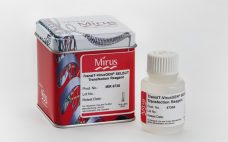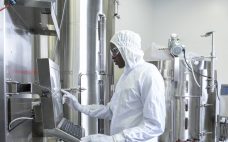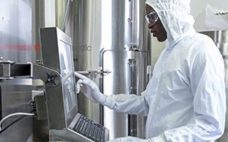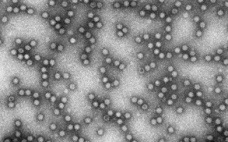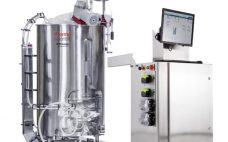This webcast features: Leisha Kopp, Applications Scientist, Mirus Bio Cell and gene therapies show unparalleled promise to improve the human condition by eradicating cancer and rectifying genetic disorders. However, low viral titers and capacity constraints in viral vector manufacturing processes can dramatically hinder the progress of these transformative therapies. The TransIT-VirusGEN® Transfection Reagent from Mirus Bio offers a simplified, cost-effective workflow for recombinant lentivirus (LV) and adenoassociated virus (AAV) generation. TransIT-VirusGEN Transfection Reagent is also effective in both adherent and suspension HEK 293–derived…
Ask the Experts
Single-Use Technologies: Innovation and Performance
The biotherapeutic market has been rapidly adopting single-use technologies to reduce risk and improve operational efficiencies. For more than 20 years, Thermo Fisher Scientific has pioneered single-use technologies for this industry. Our products have been proven to be robust and scalable from laboratory scale-up to current good manufacturing practice (cGMP) production applications, including single-use bioprocessing equipment, flexible containment, and rigid containment product portfolios. Our webinars will explore data, innovative products, and novel strategies featuring single-use solutions for the bioprocessing market.…
Advantage of Antibody-Based Selectivity in the Purification of Next-Generation Biologics
The webcast features:Â Laurens Sierkstra, Senior Director, Business Leader Purification, Thermo Fisher Scientific Advances in biotherapeutics are generating an increasing range of complex molecules that present unique and often complex purification challenges. Affinity chromatography can serve as a platform solution for the purification of these challenging molecule modalities. An effective affinity resin can help to simplify biomolecule purification, reduce the number of purification steps, and reduce the overall cost of goods in biotherapeutic manufacturing. By taking advantage of antibody-based selectivity, camelid…
Ask the Expert: Mass Spectrometry for Relative and Absolute Quantitation of Process-Related Impurities
Qualitative and quantitative analyses of process-related impurities are critical to manufacturing a safe, high-quality drug product. During his 17 June 2020 “Ask the Expert” webcast, Steven Broome (BioPharmaSpec) described using mass spectrometry (MS) for such analyses. Focusing on isopropyl-β-D-thiogalactopyranoside (IPTG), kanamycin, and host-cell proteins (HCPs), Broome overviewed best practices for using MS to detect and quantitate low levels of impurities. Broome’s Presentation Chemicals used in biotherapeutic production can be present as impurities in the resulting drug product. These impurities can…
Enabling Increased Performance, Robustness, and Safety in Single-Use Bioreactors
This webcast features: Lara Nascimento-Brooks, Product Manager, Sartorius Stedim Biotech The discussion will focus around three relevant themes for bioprocess development on single-use bioreactors: performance, robustness, and safety. An initial overview of the current landscape developments in the biopharmaceutical industry highlights that bioprocesses should remain flexible enough in order to accommodate intensification and reduce further time-to-market. With this in mind we will discuss key aspects of bioreactor performance improvement in order to achieve that goal. Additionally, processes must remain sufficiently…
Aggressive Microbial Production from Inoculation Through Harvest in Single-Use Systems
This webcast features: Dmitrij Bugajev, R&D Scientist, and Jason D. Brown, Design Engineer, Thermo Fisher Scientific Single-use fermentors enable production facilities to utilize single-use technologies instead of traditional stainless-steel fermentor vessels, achieving equivalent expression with rapidly growing high-density cultures. In this webcast, we will compare some results from various processes with yeast and bacteria before and after technology transferred to single-use at our two facilities. We will give you our feedback as previous end users of stainless-steel fermentors and now…
Webcast: Enabling Digital Chromatogram Review for a Faster and More Reliable Operation
This webcast features:Â Martin D. Jensen, Senior Engineer, FUJIFILM Diosynth Biotechnologies Chromatogram review is a monitoring method used to verify process performance in packed-bed chromatography processes. By observing key process parameters such as chromatography column outlet conductivity or UV absorbance, it is possible to identify the signs of a poorly packed column, resin degradation, or equipment malfunction. The industry standard practice relies on performing a paper-based qualitative visual comparison of chromatography profiles against a reference batch. This approach leads to a…
Strategic Development of Characterization and Quality Control Programs for Therapeutic Peptides
This webcast features: Ashleigh Wake, UK Business Development Director, Intertek Pharmaceutical Services Peptide therapeutics are a unique class of pharmaceuticals that may be regarded, in regulatory terms, as either conventional chemical molecules, biological entities or biosimilars. Slight changes in the structure, physicochemical properties, stability, and impurity profile of a peptide can provoke an adverse immune response; therefore, safety assessment is critical. Building a well-thought-out quality control (QC) strategy is key to meeting development milestones and complying with evolving regulatory requirements.…
Predicting Viral Clearance Using a Non-Infectious MVM Surrogate in Downstream Development
This webcast features: David Cetlin, Senior Director, R&D, Cygnus Technologies As viruses can arise during the manufacture of biopharmaceuticals, regulatory agencies require viral clearance validation studies for each biopharmaceutical prior to approval. These studies are typically conducted in biosafety level (BSL)-2 facilities and require large capital and human resources. Due to these hurdles, process knowledge pertaining to viral clearance is limited during development and characterization. The use of an accurate, economical, and quantifiable non-infectious viral surrogate would enable downstream purification…
Application-Specific Enhancements to Thermo Fisher Scientific™ HyPerforma™ Single-Use Bioreactors
This webcast features: Ben Madsen, Engineer, Thermo Fisher Scientific The rapid growth of biotherapeutic manufacturing has created significant demand for workflow solutions featuring greater product yield, lower production costs, and accelerated development timelines. To address these demands, developers have moved away from “one-size-fits-all” approaches and are increasingly focused on solutions that address the specific needs of diverse bioproduction processes. Given this shift toward process-specific solutions, Thermo Fisher Scientific™ has introduced a series of application-specific enhancements to the HyPerforma™ Single Use…

